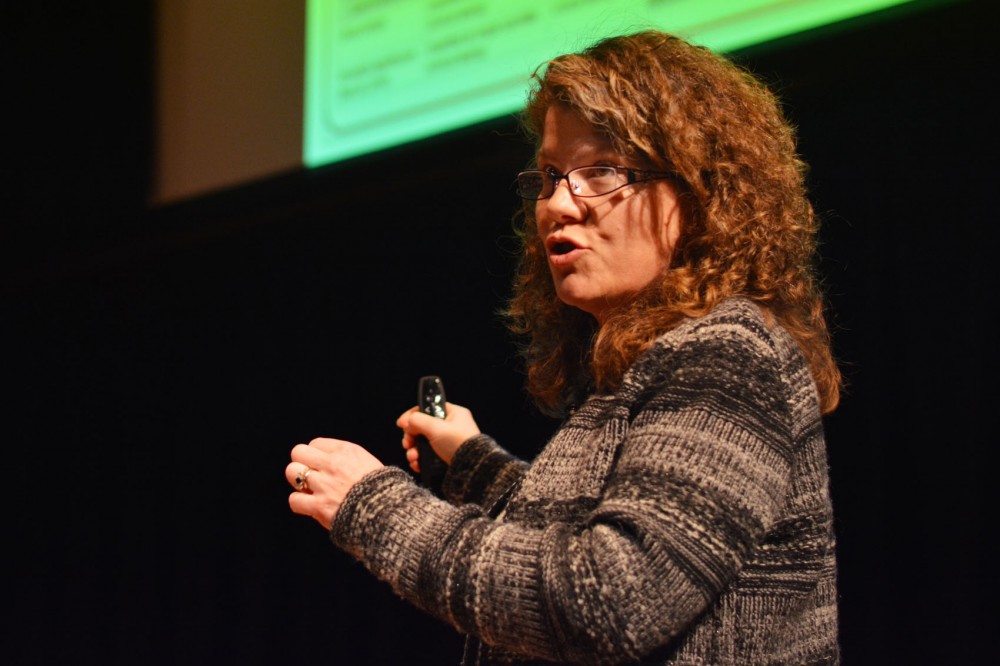Health care professionals nationwide are tangled in a discussion regarding the ethics and regulations of the growing field of precision medicine.
Also known as personalized medicine, the field aims to analyze patients’ genes so doctors can home in on treatments specific to each person.
As the talks have intensified in recent years, concerns over privacy and insurance discrimination are colliding with benefits like predicting disease contraction and better, more-personalized treatment.
The debate hit the University of Minnesota campus on Thursday with the start of a lecture series focusing on the standardization and policies of precision medicine.
Heidi Rehm, a Harvard University pathology professor, gave the first in a three-part lecture in the University’s Consortium on Law and Values in Health, Environment and Life Sciences series.
Her lecture comes soon after President Barack Obama’s announcement of a plan late last month that calls for a major biomedical research initiative that would create a biobank, or a collection of genetic data, on one million Americans.
If Congress approves Obama’s proposal, it would put individualized medicine more easily within doctors’ reach.
Rehm, who studies precision medicine, said how the technology is used and the way results are interpreted should become more standardized than they currently are.
University law professor and consortium chair Susan Wolf said the difference in technology and interpretation of genomes needs standardization.
“Right now it’s kind of a tower of Babel,” Wolf said. “And that’s really tough on patients that may get different answers from different labs.”
Obama’s proposal allocates $10 million to the Food and Drug Administration — which is in charge of regulating the precision drug industry — for developing a better regulatory structure for research labs.
Wolf said some cancer patients who haven’t been successfully treated by other methods may try genome sequencing — the analysis of a person’s complete set of DNA and genes — to see if their genes indicate an increased risk for cancer.
She said research labs are accustomed to developing and performing their own unique tests. And because there’s no common thread between all of them, Wolf said, the FDA considers some tests to be unreliable.
Different labs can interpret similar tests in different ways depending on the amount of testing done, said Dr. Douglas Yee, the director of the Masonic Cancer Center.
But it’s a tough balancing act to ensure patients receive sufficient care without putting too many regulations on research, Wolf said.
“Much of the genome we can’t interpret,” Rehm said, “and we have a lot of work [to do] to be able to ever interpret it.”
Potential ethical implications
Ethics also play into the concerns surrounding precision medicine.
It can be difficult to determine if a doctor should tell their patient about a potentially harmful genetic mutation in cases where they aren’t sure how it might affect the patient’s health, said Dr. Bharat Thyagarajan, who’s works with the University’s molecular diagnostics lab.
“If you do know what the mutation does, there’s no question, you report it,” he said.
For example, if a doctor informs a patient about a mutation in their genome whose significance isn’t known but could be linked to breast cancer later in life, the patient may decide to have a potentially unnecessary mastectomy.
Insurance companies could also use the results of precision medicine tests to inform insurance plans.
The companies would rather not pay for a costly experimental drug to treat a disease if a doctor can use the patient’s genetic information to predict whether it would work, Rehm said.
“If a patient has cancer and there’s a lot of experimental or costly cancer drugs,” she said, “you don’t want to pay $12,000 a month as an insurance company for a drug if the … genetic makeup of their tumor isn’t indicated for that drug.”
Yee said if insurance companies are aware of the implications of a patient’s genome, it may lead to genetic discrimination.
The Affordable Care Act and the Genetic Information Nondiscrimination Act have broad defenses against genetic discrimination, but there are some gaps in protection, Wolf said.
“People don’t actually have complete protection against genetic discrimination,” she said.
While GINA protects people from health insurance and employment discrimination, it doesn’t regulate disability, long-term care or life insurance, she said.
Wolf said the concern over genome privacy protection was sharpened by Obama’s announcement because the people whose genes will form the biobank will need that protection.
Yee said the plan is now possible because of recent advances in technology and computing power and a decrease in the costs of genetic tests.
“If we don’t start collecting data today, we’ll never know,” Yee said.


